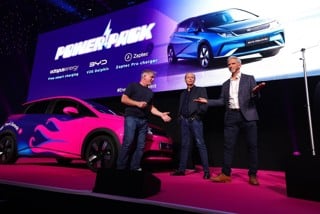Motability has dismissed fears that new eligibility rules which have resulted in thousands of early terminations of car leases will have an impact on used car values.
The switch to a Personal Independence Payment (PIP) in 2013 from Disability Living Allowance (DLA) has seen tens of thousands of disabled people reassessed for their benefit with almost 14,000 having their Motability cars taken away.
The new scheme meant new applicants for disability benefit, as well as those reassessed, would have a face-to-face interview with an outsourced private company and need to meet a points tally to qualify for PIP.
More than 30,000 people on higher rate DLA have been reassessed for PIP, and 13,900 have been made to give up their vehicle.
Damian Oton, head of vehicle remarketing at Motability Operations, said: “To put the PIP transition into context, 60% of customers are of working age and will be reassessed – the current DWP time lines are that this will be before the end of 2018; 40% of customers are not of working age and therefore will not be affected.
“Currently, there are around 55,300 new PIP recipients with live agreements on the scheme – this is people who have become newly eligible for the Motability scheme by receiving PIP. Around 13,900 customers have been unsuccessful in their PIP application.
“The company remarkets in excess of 173,000 vehicles a year direct to trade, via a network of 5,500 dealers through our online remarketing platform, mfldirect.co.uk. The mix of vehicles remarketed is vast and varied, both in terms of makes and models and vehicle age.
“The significant volumes of cars already remarketed each year, and the relatively low volume of those currently impacted by PIP, means there are no major challenges.”
Orton’s view has been supported by pricing guide Cap HPI. It said any early termination of Motability vehicles since 2013 did not appear to have had an affect on residuals.
Motability Operations runs the car scheme under contract to the charity Motability. It is seen by manufacturers as a low-profit but genuine source of sales. They benefit from steady supply of three-year-old cars returning to the market, generating interest in their brands.
All carmakers have a presence in this sector, although the 10 biggest by volume account for almost 82% of sales.
The biggest, Ford, registered 50,313 cars last year, for a 21.5% share. Five other carmakers hit five figures: Vauxhall (44,720 – 19%), Nissan (23,662 – 10%), Volkswagen (17,095 – 7.3%), Citroen (13,138 – 5.6%) and Peugeot (12,971 – 5.5%).
Customers who have been told they no longer qualify for a car are entitled to appeal, and they will continue to receive the Motability allowance for a further four weeks. Motability Operations allows the customer to keep the car for a further three weeks, and offers a support package of £2,000, which is intended to help with their immediate transport needs or help fund a replacement car.
Oton said around 10% of customers have used the money to help buy the Motability car they had been using.
He added: “Anyone who doesn’t qualify for PIP will receive a ‘Staying Mobile after Motability’ guide and details of a range of insurance companies, such as broker Autonet Mobility, who has a panel of 21 insurers, all of whom will take into account customers’ claims histories, provided by RSA.”
Motability has already provided £16m in support through this transitional package.
Despite the rule changes, and the addition of a £25,000 value cap to Motability cars in 2011, the scheme has continued to grow over the past five years (see graph).
Oton added: “We have consistently increased the vehicle choice available to Motability customers, culminating in the current price list which includes over 2,000 cars.
“As a result, MFL Direct now offers a wider choice of low mileage, franchise-serviced vehicles to trade buyers than ever before, supporting strong residual values that are then reinvested into the business, to provide great customer pricing.”
Motability top 10 by car brand
1 Ford – 50,313
2 Vauxhall – 44,720
3 Nissan – 23,662
4 Volkswagen – 17,095
5 Citroën – 13,138
6 Peugeot – 12,971
7 Renault – 9,037
8 Hyundai – 7,924
9 Kia – 6,903
10 Škoda – 5,865



















Login to comment
Comments
No comments have been made yet.